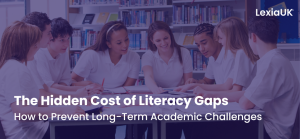Introduction
Literacy is the foundation for success across all subjects, yet gaps in reading comprehension and writing can often go unnoticed. These gaps can hinder their ability to engage with subject content, complete coursework, and succeed in exams. Because literacy difficulties do not always present in obvious ways, students may develop coping mechanisms that mask their struggles. This means that by the time gaps are identified, they may already be limiting academic potential.
This article explores how hidden literacy gaps can affect secondary students, the long-term consequences of leaving them unaddressed, and practical strategies to ensure that all learners can access and succeed in their education.

How Do Literacy Gaps Go Unnoticed?
Secondary schools naturally focus on subject-specific learning, assuming students have already acquired foundational literacy skills. However, literacy underpins success in all subjects such as understanding exam questions in maths, evaluating sources in history, or structuring an argument in science. Some literacy gaps may also go unnoticed due to the way primary assessments are structured. For example, the heavy weighting of spelling in the SPAG SATs paper means that students who are strong spellers but have grammatical deficits may fly under the radar. As a result, secondary students with undiagnosed literacy difficulties may struggle with:
- Reading comprehension: Difficulty understanding and analysing complex texts, leading to surface-level learning.
- Academic vocabulary: Limited ability to access subject-specific language.
- Written expression: Struggling to structure responses effectively in exams and coursework.
Because secondary students often develop strategies to work around these issues—such as avoiding reading aloud or memorising content without fully understanding it—literacy gaps may not become apparent until exam results or disengagement highlight a deeper problem.
The Long-Term Impact of Hidden Literacy Gaps
Literacy difficulties don’t just affect academic achievement; they can have a lasting impact on a student’s future. Challenges include:
- Reduced academic engagement: Students who struggle to access texts in various subjects may withdraw from active participation.
- Limited exam success: Poor literacy skills can prevent students from effectively understanding and answering exam questions, even in non-English subjects.
- Fewer post-16 opportunities: Many college courses, apprenticeships, and career paths require strong literacy skills. Without targeted support, students may find their options significantly limited.
Proactive Strategies to Close the Literacy Gap
Addressing literacy challenges in secondary schools requires a whole-school approach that prioritises early identification, personalised intervention, and cross-curricular literacy development. A well-structured intervention programme can make a significant difference, ensuring that students receive the support they need to develop essential reading, vocabulary, and writing skills.
Key strategies include:
- Data-driven identification: Use assessment tools to gain insight into students’ reading and comprehension levels. Early detection allows for timely intervention before gaps widen. Digital solutions like Lexia® PowerUp Literacy provide real-time data on student progress, helping educators pinpoint specific areas for improvement.
- Targeted interventions: Provide structured, personalised support to students struggling with literacy, ensuring they receive help that meets their individual needs. Adaptive literacy programmes such as PowerUp adapt to each student’s ability, offering targeted instruction in word study, grammar, and comprehension to build core literacy skills efficiently.
- Embedding literacy across the curriculum: Encourage subject teachers to integrate reading strategies, vocabulary support, and writing scaffolds within their lessons. Literacy development shouldn’t be confined to English lessons alone. Due to its broad content and skills-based approach, PowerUp helps students develop literacy proficiency in ways that can be applied across all subjects.
- Engaging and age-appropriate support: Literacy challenges in older students require a different approach from primary-level interventions. Ensuring materials are relevant and accessible can boost motivation and progress. PowerUp’s age-appropriate content and game-based activities keep students engaged while developing essential literacy skills at their own pace.
A Commitment to Literacy for All
Every student deserves the opportunity to succeed, regardless of their starting point. By recognising and addressing hidden literacy gaps, educators can empower students with the skills they need to access the full curriculum, achieve their potential, and build brighter futures.
To learn more about how Lexia PowerUp Literacy can support your students, visit our product page.
Are you ready to PowerUp your students' literacy skills?
Spare 30 seconds to complete our contact form and one of our team will get in touch to discuss your requirements. Alternatively, call on 0191 482 1939.
